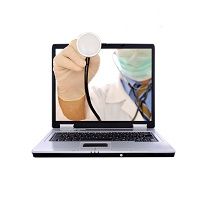Online Counseling Doesn't Dramatically Alter Outcomes for Adolescents with Acne
A recent study compared patient education efforts using traditional websites with offerings that included automated online counseling for adolescent acne sufferers.

Use of technology in medicine continues to expand and improve, but it isn’t always a panacea. A recent study in JAMA Dermatology compared patient education efforts using traditional websites with offerings that included automated online counseling for adolescent acne sufferers. You might expect that a more personalized and customized approach to patient education would yield greater outcomes.
Patient education is a crucial component of acne treatment and adherence to therapy—both in the form of medications and regular cleansing and skin care. Most patient education efforts include only a standard educational website.
The study was a randomized clinical trial conducted between March 27, 2014, and June 27, 2014, including a 12-week follow-up in a local inner-city high school. Ninety-eight students aged at least 13 years with mild to moderate acne were eligible for participation. Participants were given a standard educational website or an automated-counseling website. Would the added benefit of an online counseling component significantly alter the number of acne lesions?
In the case of this participant group, the answer was no. The primary outcome measured was the total acne lesion count, but additional measurements included the Children’s Dermatology Life Quality Index (CDLQI) scores and general skin care behavior. Forty-nine participants were randomized to each group. At baseline, the mean (SD) total acne lesion count was not significantly different between the standard-website group and the automated-counseling—website group, and there was no statistical difference between the standard-website group and the automated-counseling–website group. However, there were some positive results in terms of adherence to a recommended skin-care routine for the participants who received automated counseling.
According to the article, “For some participants in this study, this alliance [with the virtual counselor] may have provided effective counseling on skin care or positive feedback that reinforced current behaviors.”
As with many patient education efforts, simply providing access to great resources doesn’t mean patients will take advantage of them. The positive impacts of the added online advisor component were limited by the lower-than-expected use of the study websites. But the stud authors noted that the results suggest that interactive education may still carry the potential to improve long-term clinical factors.